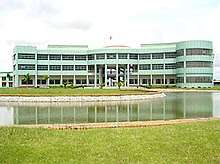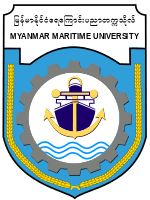Myanmar Maritime University
Myanmar Maritime University (MMU) (Burmese: မြန်မာနိုင်ငံ ရေကြောင်းပညာ တက္ကသိုလ် [mjəmà nàɪɰ̃ŋàɰ̃ jèdʑáʊɰ̃ pjɪ̀ɰ̃ɲà tɛʔkəθò]), located in Thanlyin in the outskirts of Yangon, is the premier university of maritime education in Myanmar. MMU offers 5-year bachelor's degree programs. Starting from 2012, MMU, administered by the Ministry of Transportation, offers two-year post-graduate diplomas in various marine and naval disciplines.[1] In 2007, the school had about 1,800 graduate students, pursuing international STCW-95-standards compliant maritime education.[3]
မြန်မာနိုင်ငံ ရေကြောင်းပညာ တက္ကသိုလ် | |
 Main Building of the Myanmar Maritime University | |
| Type | public |
|---|---|
| Established | 1 August 2002[1] |
| Rector | Myat Lwin |
| Students | 300 per intake of 2016[2] |
| Undergraduates | 1741 (2007)[3] |
| Location | |
| Affiliations | Yangon Technological University, Korea Maritime University, Nagaoka University, Nihon University, Tokyo University of Marine Science and Technology |
| Website | www |
 | |
History
MMU was officially established on 10 June 2002 by the military government per the Myanmar Maritime University Act (The State Peace and Development Council Law No. 1/2002). The official mission of MMU is to "produce well competent qualified naval architects, engineers and scientists".[4] On 1 August 2002, the university first opened its doors inside the compound of Yangon Institute of Marine Technology, in Sinmalike, Yangon. Since March 2004, the university has been relocated to its present purpose-built campus in Thanlyin near Thilawa port, the country's largest port.[3]
Admissions
MMU is one of the most selective universities in the country. Admissions are based primarily on the marks received in the Burmese university entrance examination (Matriculation Exam). The university does maintain a 20% quota of female students in its annual student intake, and all students must pass an eyesight exam.[5] As many of the graduates receive job offers from foreign shipping firms, admission to the university is highly competitive.[6] In 2006, the minimum university entrance exam score necessary to be admitted was 458 out of 600 marks (up from 443 marks in 2005) despite an increase in admissions to 450 students per year from 350 the year earlier.[7] In 2008, the admission marks were 473 out of 600.The minimum entrance mark is 491 out of 600 in 2010.
Programs
Onwards 2012,MMU offers six six-year bachelor's degree programs and two two-year post-graduate diplomas.[5] Last batch of students with 5-year degree will graduated in 2017 February. The university's syllabus, coursework and practical training are in keeping with the standards of Training, Certification and Watchkeeping for Seafarers 1995 (STCW), an international convention developed by the International Maritime Organization that sets qualifications and training standards for personnel serving aboard seagoing merchant ships.[6]
Engineering
| Program | Bachelor's | Type | Duration |
|---|---|---|---|
| Naval Architecture | B.E. | FT | 5 Yrs |
| Marine Engineering | B.E. | FT | 5 Yrs |
| Port and Harbour Engineering | B.E. | FT | 5 Yrs |
| River and Coastal Engineering | B.E. | FT | 5 Yrs |
| Marine Electrical Systems and Electronics | B.E. | FT | 5 Yrs |
| Nautical Science | B.Sc. (Hons.) | FT | 4 Yrs |
| Marine Mechanical | B.E. | FT | 5 Yrs |
- First Year: Myanmar, English, Engineering Mathematics, Engineering Chemistry, Engineering Physics, Computer Science.
- Second Year: NA, ME, EE, PH, RC,MM—English, Engineering Mathematics, Computer Science,Mechanical Engineering Drawing, Applied Electrical Engineering(NA,MM,ME,PH,RC) , Workshop,Engineering Mechanics,Marine Engineering Knowledge(ME,EE),Theoretical Electronics 1(EE)
- Third Year(ME major): English,Fluid Mechanics,General Engineering Knowledge, Mechanical Drawing,Thermodynamics 1,Strength of Materials,Naval Architecture 1,Engineering Mathematics 1,Engineering Mathematics 2
Post-graduate studies
The university offers two year post-graduate diplomas in shipping management and port management for part-time, and three one-year post-graduate diplomas in shipping management, port management, and transport and logistics management for full-time studies.
Administration
List of Rectors
- Thein Tun (2002–2007)
- Dr. Charlie Than (2007–2013)
- Dr. Myat Lwin (2013–present)
Main departments
- Department of Naval Architecture and Ocean Engineering
- Department of Marine Engineering
- Department of Port and Harbour Engineering
- Department of River and Coastal Engineering
- Department of Marine Electrical Systems and Electronics
- Department of Marine Mechanical Engineering
- Department of Nautical Science
- Department of Shipping Management
- Department of Port Management
Supporting Departments
- Department of Myanmar
- Department of Computer Science
- Department of English
- Department of Engineering Mathematics
- Department of Engineering Chemistry
- Department of Engineering Physics
- Department of Workshop Technology
Affiliated academic institutions
MMU maintains affiliations with the following academic institutions:[4]
Domestic
- Yangon Technological University
- Defence Services Technological Academy
- University of East Yangon
- Technological University, Thanlyin
- Yangon University
International
References
- "Myanmar Maritime University". Ministry of Education. Archived from the original on 10 December 2008. Retrieved 27 November 2008.
- http://monnews.org/?p=924 | Myanmar Maritime University gaining popularity
- "History of MMU". Ministry of Transportation. Archived from the original on 21 November 2008. Retrieved 27 November 2008.
- "Myanmar Maritime University". MMU Information Site. Archived from the original on 19 November 2008. Retrieved 27 November 2008.
- "Programs at MMU". Ministry of Transportation. Archived from the original on 21 November 2008. Retrieved 27 November 2008.
- Win Nyunt Lwin (12 November 2006). "Maritime students enjoy more job opportunities". The Myanmar Times.
- Win Nyunt Lwin (20 November 2006). "MMU offers new courses". Cite journal requires
|journal=(help)